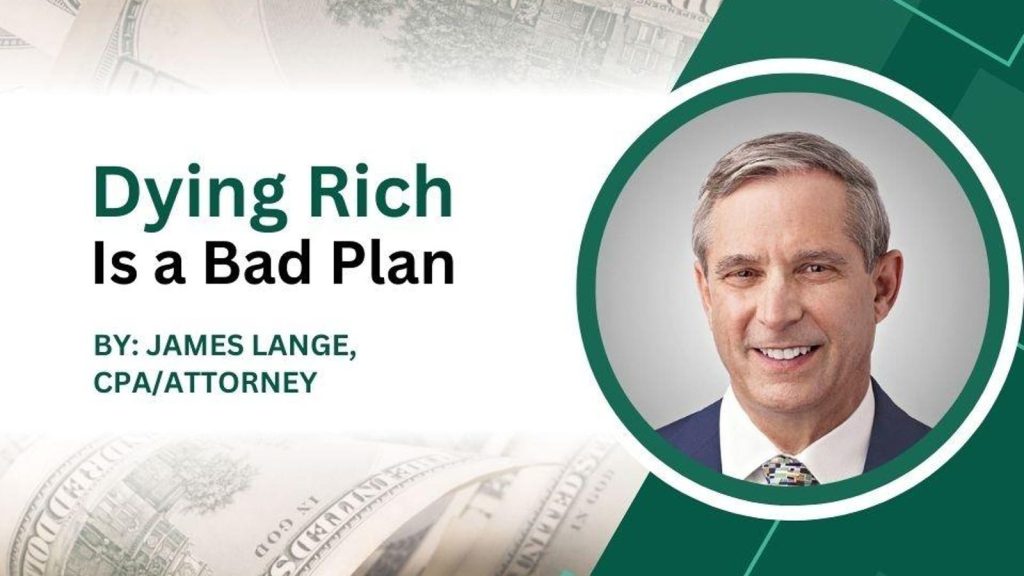One of the most common mistakes financially savvy people make is dying with too much money. They fail to come up with a long-term spending and distribution plan. To some extent, we fall back on familiar patterns. If we have enough money to do what we want to do, and we do not feel as if we are depleting our savings, we do not give sufficient thought to gifting and distribution planning. But we should!
Without a thoughtful spending and distribution plan, you may accumulate too much money. And after your death, that money won’t all go to your kids. Uncle Sam will take a huge cut—especially after the SECURE Act. Your children, who may be in their sixties (if not older) when you die, will inherit what is left after taxes.
Furthermore, their inheritance later in life will not be as meaningful as smaller gifts received earlier. I suspect you are giving some monetary gifts to your children and even funding 529 plans for your grandchildren. But it is also likely that your “spending and gifting efforts” are far too conservative. Do not die with the regret that had you spent more and gifted more earlier, that money could have made a huge difference to you, your spouse, and your kids and grandkids as well as your favorite charities.
Face it. Dying with too much money is a lousy plan for someone as bright and thoughtful as you.
I am not saying you should spend flagrantly. Hope for the best and prepare for the worst—including a potential long downturn in the market, an expensive illness, or a long period of incapacitation. But so many investors save much more than they will need, even accounting for these and other contingencies.
A much better plan would be to try to gage how much you can actually afford to spend and gift—and then start doing it or at least move in the direction of spending and/or gifting more.
Think about this for a minute. Let’s say that somebody gave you or you inherited $100,000 tomorrow. Would it have a significant impact on your life? Or would it just add more to your investments? Would you suddenly decide to eat out more often or go on one more vacation? Not likely. But think of receiving a gift of that amount (adjusted for inflation roughly $50,000) 30 years ago. How would that have changed your life?
Well, your children might be in that same situation now.
Parents also frequently underestimate their children’s stress level about money. Adult children don’t necessarily want to count on an expectancy (that is the amount that you’ll leave them after you die). With an uncertain job market and the expense of raising kids and college tuition, it is very possible that your adult children may be facing significant financial stresses. Wouldn’t it be a good idea to help them now, when they truly need help?
For example, maybe they could buy a house or move to an area that they cannot afford right now that has good public schools. Or alternatively, they could use some money for private schools or parochial schools. Or maybe they could just use some money for some things that you denied yourself when you were their age.
Wouldn’t it be a better plan to use some of that money while you are alive so you and your kids can experience additional enjoyment, stress reduction and a better life all around?
Many parents worry that giving too much money too early may reduce motivation. How early is too early? Is your kid an irresponsible 20-year-old or a responsible 50-year-old with an excellent work ethic and a history of thoughtful saving and spending? You can decide and make decisions based on your good judgment. And you can also make recommendations for how your gift is to be used, such as providing money for Roth IRAs and retirement plan contributions. I am confident you can think of ways that will help your kids no matter their circumstances.
And literal gifting is not the only option. I have long recommended sponsoring a family vacation annually, if you can manage to corral the extended family, or whenever it is possible. Or, what about just taking a month or two and heading South in the winter without the kids. Yesterday I was speaking to a thoughtful client who would love to do just that and could clearly afford to do that. It wasn’t even on his radar. Another client could afford to spend an extra $10,000/month. He bragged to me that he was going on an expensive vacation in Europe. I asked him if he was travelling business or first class and of course his answer was no. Well, at least I got them thinking about it.
I am not advocating spending and being generous to the point of putting yourself in financial jeopardy, but with your help, you and your family will have a much better life if you have a good distribution plan.
There are other ways to spend money too. I often hear, “I have everything I want. What else should I spend money on?” Personally, I’m also a big believer in spending money on personal healthcare.
I like having the services of a concierge MD, and I suspect you would too. Any time I have a problem, I call or email and get a response, and, if needed, an appointment. I also spend money on supplements and other things that are not covered by health insurance.
Without my personal trainer, I would not keep on top of my strength training, which is particularly important as we get older.
I work with a nutritionist who, after getting results of a variety of tests, developed my ideal eating plan. Of course I don’t strictly follow the plan, but I am eating more healthier meals than I ever have―selected with my wellness in mind. I schedule tests not covered by insurance to get helpful information. For example, one test revealed I had dangerously high mercury levels. I paid good money for a treatment plan that was also not covered by insurance, but significantly reduced my mercury readings. To me that was money well spent.
The bottom line is that you need to look realistically at your finances. Speak with your financial advisor or work out how much you can safely spend. Map out what you might conceivably need for your long-term security, even overestimate what you think you will need. Then think about your kids and the charities you support and come up with a plan to distribute some money in a manner that will have the biggest impact.
So, please consider these observations. Hopefully, this article will at least get you thinking and gifting more. If you do, I believe you and your family will live a happier life.
Read the full article here















